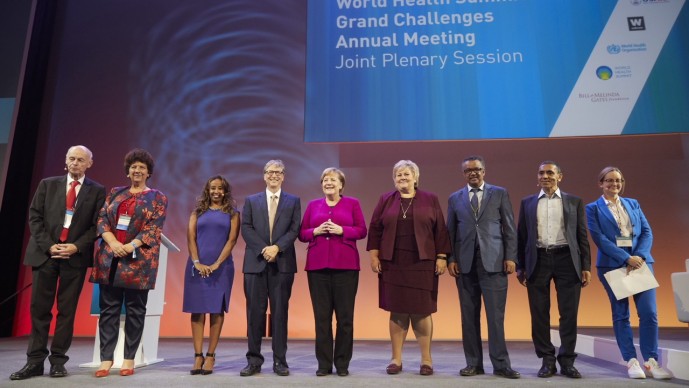Chiemelie Ezeobi highlights the significance of the Grand Challenges Annual Meeting, an event designed to catalyze cooperation among researchers, funders, and other stakeholders to expedite innovative solutions for addressing critical global health and development challenges. This year’s meeting, held in Dakar, Senegal, marked the 20th anniversary of the “Grand Challenges” initiative and introduced fresh investments with a call for making Research and Development (R&D) breakthroughs more accessible and equitable.
From its inception in 2003, the Grand Challenges, the flagship innovation program of the Bill & Melinda Gates Foundation, has garnered attention and funding for pressing global health and development issues that disproportionately affect the world’s poorest populations. It employs open calls for proposals to engage the global community in crowdsourcing potential solutions.
This initiative has been supported by numerous governments worldwide, including those of India, Brazil, the United States, Canada, and several African countries like Ethiopia, Rwanda, Senegal, and South Africa. Over the years, partners have collectively invested $1.6 billion in supporting over 3,800 projects in 118 countries. These projects have addressed a wide range of issues, from enhancing maternal and child gut health to reimagining sanitation with advanced toilet designs, to revolutionizing drug discovery research for diseases like malaria, tuberculosis, and neglected tropical diseases. The initiative has also cultivated a global innovation ecosystem, primarily in regions where it can have the most significant impact.
At its core, the Grand Challenges family of programs draws inspiration from a century-old concept: that seeking solutions to well-defined, unresolved problems can stimulate innovation and accelerate progress. In 2003, the Bill & Melinda Gates Foundation and its funding partners harnessed the power of open requests for grant proposals to focus on urgent global health and development problems for the most vulnerable populations.
The 2023 Grand Challenges Annual Meeting in Dakar, Senegal, emphasized the importance of supporting locally led innovation. It was hosted by the Global Grand Challenges network of partners and the Senegalese government, with sponsorship from organizations like Grand Challenges Canada, the United States Agency for International Development (USAID), Wellcome, and the Bill & Melinda Gates Foundation.
This year, the initiative introduced several new initiatives to bolster innovation on a local scale and issued a call for increased funding to streamline the research and development of health and development solutions, ensuring that the next wave of scientific and technological breakthroughs is both relevant and accessible to all.
While overall funding for health R&D has been increasing, data shows that merely two percent is allocated to diseases affecting the world’s poorest. In 2020, the funding gap for product development aimed at poverty-related and neglected diseases was estimated at $2.6 billion.
Moussa Balde, Senegal’s Minister for Higher Education, Research, and Innovation emphasized the need to expedite innovations’ journey to those who need them. He noted that despite reducing childhood deaths under five by half over the last two decades, there remains a critical delay in delivering these lifesaving innovations. He expressed his pleasure at Senegal’s participation in the Grand Challenges network and its investment in locally led solutions across various sectors, including health, education, and agriculture.
Bill Gates, co-chair of the Gates Foundation, delivered a call to action during the meeting. He urged the world to invest an additional $3 billion annually in global health and development R&D to bridge the significant funding gaps for neglected diseases. He emphasized that new health technologies have the potential to save millions of lives, but the current direction of R&D funding needs to be reevaluated to ensure that health innovations reach those in urgent need more expeditiously.
In Dakar, Bill Gates also announced a $30 million investment by the foundation to support a new artificial intelligence (AI) platform in Africa. This platform will provide African scientists and innovators with the necessary technical and operational support to transform promising concepts into scalable health and development solutions. This investment underscores the commitment to make AI benefits affordable and accessible to all, particularly in low- and middle-income countries, and to ensure the ethical and equitable development of these critical tools.
The foundation also disclosed new investments aimed at expanding access to a novel mRNA vaccine manufacturing platform. This platform will enable countries like Senegal and South Africa to develop and manufacture their vaccines, thereby advancing vaccine production capacity and addressing pressing health challenges in low- and middle-income countries.
In his closing remarks, Mr. Gates underlined the significance of immediate action. He emphasized the potential of the scientific and technological community, together with effective funding, to make transformative innovations widely available. In pursuit of this vision, the Bill & Melinda Gates Foundation and its partners called for new proposals, inviting scientists to present solutions to ongoing challenges and opening opportunities for innovative research and development.
The Bill & Melinda Gates Foundation, guided by the belief that every life has equal value, strives to enhance people’s health and elevate them out of hunger and extreme poverty in developing countries. In the United States, the foundation works to ensure that all individuals, particularly those with limited resources, have access to opportunities for success in education and life.
Over the years, the Grand Challenges initiative has evolved from a single program funded by the Gates Foundation into a dynamic set of projects and collaborations that foster research, innovation, and partnerships for the benefit of the world’s most vulnerable populations. The inspiring innovations emerging from this vibrant community serve as a testament to the power of ideas and the critical role of funders, policymakers, and advocates in translating those ideas into meaningful real-world solutions.
The 2023 Grand Challenges Annual Meeting in Dakar, Senegal, was a testament to the enduring relevance of this initiative, demonstrating its commitment to addressing global challenges and forging a brighter future for humanity.




